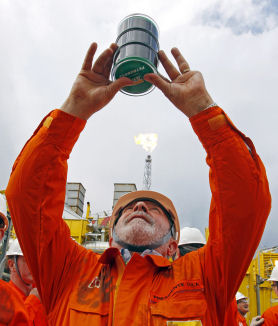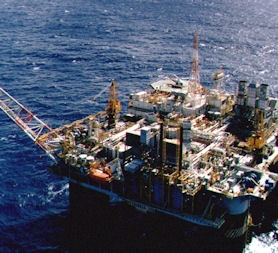Brazil’s climate change dilemma
Channel 4 News spends a week in Brazil and finds an emerging economic power house approaching environmental crossroads.
The country’s image as a pioneer of green energy is facing a major threat. Although the majority of Brazil’s cars are powered by ethanol, oil looms large on the horizon.
The Petrobras platform, at the heart of the oil-rich Campos Basin, is capable of producing a world record-breaking 100,000 barrels of crude per day.
The discovery means Brazil could rocket into the top five world oil centres, alongside Kuwait and Iraq.
“You have a lot of poor people in this country and they need, and they have the right, to have energy.” Mauricio Tolmasquim
Ministry of Mines and Energy Mauricio Tolmasquim says: “Each Brazilian consumes less than seven times each American.
“You have a lot of poor people in this country and they need, and they have the right, to have energy.”
If the government uses the oil to accelerate economic growth it could lift thousands out of poverty.
However, an acceleration in climate change through increased emissions could also hit thousands of the country’s poorest people.
Brazil: pay us to sustain the world’s lungs

President Lula da Silva looks at the first oil drilled at Baleia Franca in July 2010. (Getty)
Brazilian climate and energy analyst Luiz Pinguelli Rosa told Channel 4 News: “In Brazil we have to deal with both poverty and the environment. We need to solve the reduction of carbon dioxide emissions and also the income distribution of the country.
“I believe that you can do both if you have an economy based on renewable energy. That is possible for Brazil, after all we use ethanol in our cars and we use much more hydro-electricity and wind-produced energy.
“Around the world, we need the state to intervene in planning. At the start of the ethanol programme, it was expensive but the government decided to stimulate the ethanol market and I believe they must do the same now.”
Norway’s environment minister Erik Solheim responded: “We have promised to cut carbon emissions by 30 per cent in Norway by 2020 and we will do that both with strong domestic action and the purchase of global carbon credits.
“Naturally we will have to take decision in the oil and gas industries, transport and all other sectors.
“I think it is hard to ask a developing nation like Brazil not to exploit substantial oil reserves if they can have a surplus from that and use that in developing their nation.
“I think it is hard to ask a developing nation like Brazil not to exploit substantial oil reserves if they can have a surplus from that and use that in developing their nation.” Erik Solheim
“Here in Norway we tried to make sure our oil and gas sectors were as environmetally friendly as possible with emissions as small as possible and then we tried to use some of the revenues gained in a positive way globally and we tried to develop the technique of carbon capture and storage.
“Now we have a debate about whether we should exploit all the oil that is available or whether we should leave some of it underground.
“As an environmentalist I believe that we should not necessarily exploit all the oil.”
Can we save the world's lungs?
Deforestation accounts for one fifth of global greenhouse gas emissions and halting it would be as powerful as closing all the world's coal-fired power plants.
Details of the Redd (Reducing Emissions from Deforestation and forest Degradation) plan are complex but at root it involves rich countries paying countries with rainforests not to cut down trees.
Jonathan Miller travelled 2,000 miles across the Amazon Basin, which contains more than half the world's remaining rainforest, to ask Brazilians who live and work there what they make of this plan.
Read more

Rio to Kettering: ready to save the planet?
With many still unconvinced about the need to tackle global warming, do people around the world really have the will to make sacrifices?
United Nations figures reveal the most “representative” town in the UK for testing attitudes to climate change is Kettering. Channel 4 News united a sample of residents from the Northamptonshire market town together with people in Rio de Janeiro, 6,000 miles away.
Kettering was represented by student Rebecca Richards, school governor Karen Young, retired factory supervisor Ray Maylin and Pat Curran, a fork lift truck engineer.
In Rio the panel was made up of Natan Oliveira Ferreira and Felipe Barbosa Gomes, both students, English teacher Márcia Garcia, and farmer Ireide Walker.
Karen Young in Kettering said the words “fundamental and profound” could be misleading when in fact what is needed is small changes by everyone.
She said: “I think we have to take those small steps first. We’re all responsible and we should all think about this very seriously.
“In the past five or ten years people in England have become far more conscious of the waste we have from our consumer society.
“We’re trying to make small changes ourselves – it may seem very little to have an allotment or to consciously turn down the thermostat at home, to not make car journeys unless they’re necessary.”
“All these small things do add up.”
Marcia Garcia in Rio agreed with the approach.
She explained: “I make small changes, not turning on the air conditioning 24 hours a day, not littering – which is something that happens a lot in Rio, turning off the fans….”
But many in Rio are poor and do not have fans or air conditioning.
Felipe Barbosa Gomes said: “Sometimes they don’t even have things to separate their garbage – it’s not accessible or tangible to everyone here in Brazil.”
From Petrochemicals to Weetabix: Rio v Kettering
Rio de Janeiro means "river of January". Kettering derives from a 10th century name which means "place of kinsfolk"
Population: Rio 6.2m, Kettering 82,000
Average temperature: Rio's tropical savanna climate means largely hot and humid conditions, with average highs around 30 degrees celsius. There is a rainy season from December to March. In Kettering, Northamptonshire, summer temperatures average at around 20 degrees, dropping to 6C in the winter when it is often wet and windy.
Economy: Rio is a large industrial city with shipbuilding, steel, oil, petrochemical, gas, textile and pharmarceutical industries. It also has a fast-growing electronics and computer sector.
Kettering grew out of the boot and she trade of the early 19th century. Engineering blossomed with the arrival of the railways. Today it is home to several well-known brands including Weetabix and Timpson Ltd.
Famous inhabitants: Rio - footballer Ronaldo, Kettering - politician John Profumo
In Kettering student Rebecca Richards said she believed young people in the UK are ready to make sacrifices – and settle for slightly less than their parents.
“I think that’s a given. If we start now we could protect future generations from suffering as we might do in the future.”
In Rio, Natan said: “Here in Brazil we don’t have this environmental culture, maybe in the UK they have this culture among themselves.
“[For example] when we go to the beach we see a lot of trash on the beach.”
“We are suffering from this climate change.” Natan Oliveira Ferreira
“But we are suffering from this climate change.”
Former factory worker Ray Maylin challenged Ireide Walker over farming methods in Brazil and the country’s commitment to bringing down emissions.
She responded: “We will try hard to do it better. People in the past and until now thought that farming in the old-fashioned way is the right way, as other countries did.
“I think now we should be green farmers, but since we are the lungs of the planet it is very difficult to ask the people in Brazil to change – and tell them they cannot expand their farms. We need to educate people.”
Felipe Barbosa Gomes added: “I believe the government can do something about this – through legislation. For instance, to punish farmers that chop down trees.”
On Brazil’s high birth rate Márcia Garcia said she wanted to see action.
“Definitely, I think the government should impose laws so as to control it. And also to educate people and make it possible for poor people to access treatment [contraceptives].”

Carbon offsetting Channel 4 News from Brazil
Broadcasting Channel 4 News from Brazil was a major technical and logistical exercise. And Brazil is a big country – bigger than Europe. So we were well aware from the start that there was a certain irony in flying people and equipment thousands of miles around the world to report on climate change, when doing so would mean emitting a lot of carbon dioxide into the atmosphere – to contribute to the very problem we wanted to report.
It was justified, of course, because it is overwhelmingly important that the other side of the climate story is told – and seen through the eyes of the people of a key developing country, for it brings a global perspective to a global problem.
Imperfect though it may be, we have offset the carbon emissions from our travels. All the flights both to and from Brazil and within this vast country for around a dozen people; the boats we used on the Amazon; the vans and cars we used to carry the kit around; all in all that added up to just under 100 tonnes of carbon at £13.80 per tonne, the current price of carbon in the European Emissions Trading Scheme.
By doing so, we have taken an allowance of 100 tonnes of CO2 emissions out of the European market that would otherwise have been used by someone else.
The ETS has problems, we know. We’ve reported on them. But it’s all there is at the moment. And we have chosen to offset through an organisation that deliberately maximises the environmental benefit of the money we’ve spent.
Sandbag, set up by former Friends of the Earth campaigner Bryony Worthington, only buys emissions credits from companies or organisations that contractually agree to spend the money they receive on measures to save energy, thus reducing CO2 emissions further.
So we bought our 100 tonnes of CO2 credits from St Thomas’s Hospital in London. Under the European ETS they have a limit on the amount of CO2 they can emit from their large boilers and heating systems. But because they have installed a less-polluting, more efficient Combined Heat and Power plant, they have pollution permits to spare. In return, they spend our money on installing low energy light bulbs in the wards – so further reducing their emissions by saving energy.
And what of the emissions credits we then got? Well, we used them for our coverage from Brazil and the system doesn’t allow them to be used again, so there’s no point in trading them on to someone else. But just to make sure, we torn them up.
-
Latest news
-
India’s ‘YouTube election’: Influencers enlisted to mobilise youth vote6m

-
Putin denies plans to capture Ukrainian city of Kharkiv3m

-
Plaid Cymru ends co-operation agreement with Welsh Labour government4m

-
Infected blood scandal: Government was warned years before taking action6m

-
Displaced in Gaza have to ‘start from Zero’ many times over, says Gaza NGO director3m

-




